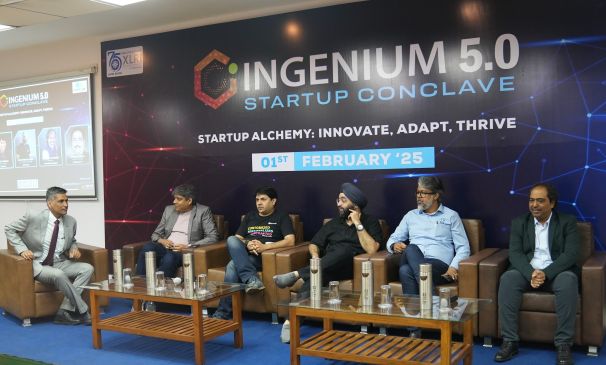
The Ingenium 5.0 Startup Conclave of XLRI Jamshedpur which concluded recently reinforced its reputation as a premier platform for celebrating entrepreneurial spirit and innovation. Themed “Startup Alchemy: Innovate, Adapt, Thrive,” the event provided an engaging and thought-provoking environment, bringing together seasoned entrepreneurs, industry leaders, and students to explore the evolving dynamics of the startup ecosystem.
The conclave served as a melting pot of ideas, emphasizing the role of innovation, adaptability, and resilience in building sustainable ventures. It offered invaluable insights into the ever-changing startup landscape, highlighting strategies for frugal innovation and the significance of organizational culture as a competitive advantage. The event underscored the importance of entrepreneurial agility, problem-solving, and leadership, inspiring future business leaders to leverage challenges as opportunities for growth.
The event commenced with an inaugural address by XLRI Dean Academics, Prof. Sanjay Patro, who spoke about the transformative impact of startups on markets and industries. He emphasized the disruptive potential of emerging ventures and their ability to drive technological advancements through strategic collaborations with public and private sector stakeholders.
The Chief Guest, Ms. Vipra Bhal, IAS Officer and Secretary to the Government of Jharkhand, provided deep insights into the government’s role in fostering a thriving startup ecosystem. She highlighted how Indian startups are securing a strong global foothold through policy support, strategic investments, and innovation-driven initiatives. She also shed light on Jharkhand’s proactive startup policies aimed at creating an entrepreneur-friendly ecosystem and the importance of service delivery in sustainable business models.
The first panel featured a compelling discussion on “Frugal Innovation – Doing More with Less in a Resource-Constrained World,” with esteemed speakers sharing their insights.
- Prabhash Nirbhay, Founder of Jharkhand Angels, emphasized the importance of rapid execution, describing a formula for agile business success: “Plan in the morning, execute by the afternoon, and celebrate in the evening.” He highlighted that while fundraising is easier today, investors are increasingly focused on how funds are utilized.
- Sujay S, Co-Founder & CEO of Zwende, stressed, “While sustainability may seem expensive at first, the long-term cost of not being sustainable is far greater.” He underscored the importance of a demand-driven supply chain to ensure long-term customer alignment.
- Avnish Kumar, Founder & CEO of LivNSense, stated that “frugality is a key component of lean principles” and shared how AI can drive resource optimization. Addressing a student’s question on Green Hydrogen, he acknowledged its immense potential but pointed out the significant challenges, including long development timelines and funding difficulties.
- Amar Preet Singh, Co-Founder & CEO of Neeman’s Shoes, highlighted the role of data-driven decision-making in frugal innovation, stating, “Frugality should never be pursued without data.” He illustrated how sustainable practices, such as lowering SKUs, align with lean business principles.
- Sumit Khandelwal, CEO of Xoxoday, reinforced the strategic advantage of frugality, asserting that “frugality is at the core of every successful business,” but it must be balanced with customer-centric innovation.
In the second panel, “Culture as a Competitive Advantage – Building Great Places to Work in Startups,” industry leaders shared their perspectives on fostering a thriving workplace culture.
- Daya Shankar Verma emphasized that “building culture starts with effective communication,” noting that speaking in one’s native language can foster stronger connections and success. He pointed out the opportunities in AgriTech and the importance of aligning startups with regional policies.
- Satish Kadu, Founder & CEO of Yoptima, remarked that “entrepreneurial success isn’t just about solving problems—it starts with finding the right problems to solve.” He encouraged startups to focus on shared beliefs and values in shaping their brand ethos.
- Ankit Saraf highlighted the essence of “agency culture,” explaining that “culture isn’t built overnight—it’s cultivated by creating an environment where people feel valued and inspired to work.” He also stressed that while Indian work culture demands flexibility, maintaining a work-life balance is essential for long-term productivity.
- Ajay Singh, Co-Founder & CEO of PepSales AI, emphasized that “culture is what you do when nobody is watching.” He noted that while having millions in a company’s balance sheet is a dream, what truly matters is how that money is utilized to foster growth and collaboration.
- Chinmay Shah stated that “culture thrives when people are empowered,” underscoring the importance of leadership, autonomy, and innovation. He shared how hackathons are pivotal in fostering a culture of ownership and creativity.
Ingenium 5.0 continued the tradition of providing a robust knowledge-sharing platform, empowering students and industry professionals with actionable insights into the startup ecosystem.










